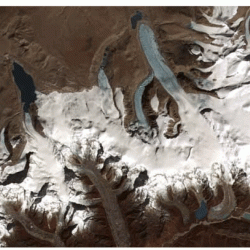Source Institutions
Source Institutions
Add to list Go to activity
Activity link broken? See if it's at the internet archive

In this activity, learners experiment and observe how the color of materials that cover the Earth affects the amounts of sunlight our planet absorbs. Use this activity to begin discussions on global warming and climate change. This lesson guide includes background information and handouts. Note: cost of materials does not include cost of thermometers or desk lamp/light bulbs.
- 5 to 10 minutes
- 30 to 45 minutes
- 1 cent - $1 per group of students
- Ages 8 - 18
- Activity, Experiment/Lab Activity, Lesson/Lesson Plan
- English
Quick Guide
Materials List (per group of students)
- 2 Thermometers
- One copy of the Bhutan glacier photo (p.4)
- Tape
- Watch or stopwatch
- Outdoor sunshine or a small desk lamp with a 150 watt bulb
- Student Page (handouts, p.5)
- Pens or pencils
Subjects
-
Earth and Space Science
-
Earth Processes
- Weather and Climate
-
Earth Structure
- Oceans and Water
- Atmosphere
- Earth, Moon and Sun
-
Solar System
- The Sun
-
Earth Processes
-
Life Sciences
-
Ecology
- Ecosystems
- Human Impact
-
Ecology
-
Mathematics
-
Data Analysis and Probability
- Data Analysis
- Data Collection
- Data Representation
- Measurement
-
Data Analysis and Probability
-
Physical Sciences
-
Heat and Thermodynamics
- Heat and Temperature
- Heat Transfer
- Thermodynamics and Entropy
- Energy
-
Vibration and Waves
- Light and Optics
-
Light and Optics
- Reflection and Refraction
- Sunlight and Color
-
States of Matter
- Changes of Phase
-
Heat and Thermodynamics
-
The Nature of Science
-
Science and Society
- Risks and Benefits
-
The Scientific Process
- Asking Questions
- Conducting Investigations
- Gathering Data
- Formulating Explanations
- Communicating Results
-
Science and Society
Informal Categories
- Nature and Environment
Audience
To use this activity, learners need to:
- see
- see color
- read
- touch
Learning styles supported:
- Involves teamwork and communication skills
- Uses STEM to solve real-world problems
- Involves hands-on or lab activities
Other
Includes alignment to state and/or national standards:
This resource is part of:
Access Rights:
- Free access
By:
Rights:
- All rights reserved, University Corporation for Atmospheric Research, 2005
Funding Sources:
- NCAR Strategic Initiative
- NCAR Opportunity Fund
- NASA
- Friends of UCAR
